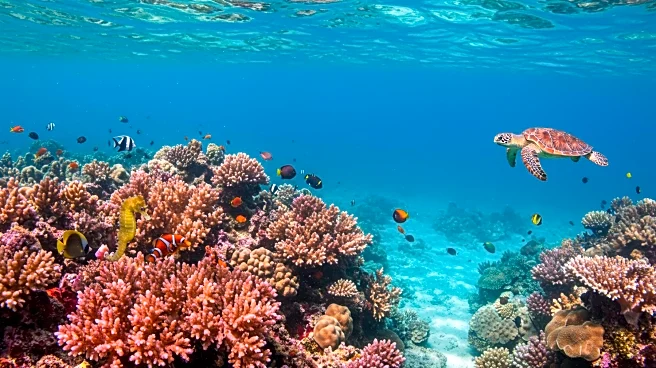What's Happening?
Marine conservationists are urging the British Government to implement bans on bottom trawling in marine protected areas (MPAs) across English seas. Bottom trawling involves dragging fishing gear across the seabed, which can destroy habitats and capture a wide array of species, including non-targeted ones. The Wildlife Trusts are calling for public support to ban this practice in 41 offshore MPAs, covering 30,000 square kilometers of sea. A consultation by the Marine Management Organisation is underway, ending on September 1, 2025. Polling indicates strong public support for protecting marine wildlife, with many unaware that bottom trawling is still permitted in some protected areas.
Why It's Important?
The ban on bottom trawling is crucial for the recovery of marine ecosystems, which are vital for biodiversity and carbon storage. Destructive fishing practices threaten marine life, including cold-water corals, sandbanks, and chalk reefs, which support various species and store significant amounts of carbon. Implementing bans in MPAs can lead to rapid recovery of marine habitats, as seen in areas like Lyme Bay and Sussex, where restrictions have led to the resurgence of species such as scallops and lobsters. Healthy seas contribute to wider ocean health and sustainable fish stocks, benefiting both the environment and the fishing industry.
What's Next?
If the ban is implemented, it could lead to significant ecological recovery in the affected areas. Conservationists expect that removing pressures from bottom trawling will allow marine habitats to recover naturally, enhancing biodiversity and fish stocks. The consultation process will determine the extent of public support and influence government decisions. Successful implementation could serve as a model for other regions, promoting sustainable fishing practices and marine conservation globally.
Beyond the Headlines
The initiative highlights the importance of public awareness and involvement in environmental conservation efforts. It underscores the need for effective management of protected areas to ensure they fulfill their purpose. The recovery of marine habitats can also have socio-economic benefits, such as improved fish stocks for local fisheries and enhanced resilience against storm impacts.








